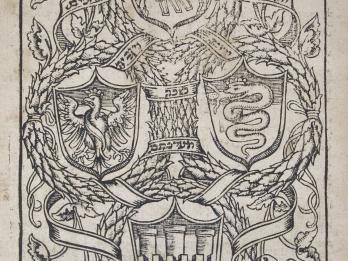The Association “Concern for the Needy”
Sholem Yankev Abramovitsh (Mendele Mokher Sforim)
Sholem Yankev Abramovitsh (Mendele Mokher Sforim)
1865
When Berdichev, that famous commercial city, began, in the last few years, to fall from its high estate and the number of newly impoverished but respectable inhabitants kept increasing, I started to think about whether some means could be found to assist the needy in their straitened circumstances. By doing so, we could at the same time prevent envy, hatred, disputes, and all manner of evils that could eventually arise in the city as a result of unalleviated poverty. When poverty begins to appear in a place, it usually brings many other ills with it. People become a bit more hard-hearted. They bend the rules of fairness. One individual trespasses on another. Each man tries to snatch the food from the other man’s mouth. “What of it,” they say. “He’s got enough, believe me. We’re people too, we want to eat too.” What is the outcome of all this? People dispute, they quarrel, they fight over a bone. Poverty is no joke! May no one have to endure it, dear God!
All of this went through my mind, until God in his wisdom sent me the wonderful idea of founding the association Maskil el Dal—that is, “Concern for the Needy,” whose goal is twofold: 1) to help respectable but impoverished people in a way that will enable them to climb back up a little—for instance by helping them to earn a living. It would not, however, simply distribute alms, which would only increase the number of idle recipients of charity; 2) to support decent people and employ all possible legitimate means to see to it that they are not wronged and to guard them against all misfortunes. To this end we have established strict rules. In particular, whoever wishes to join the association must deposit dues of at least 3 rubles for the reserve fund and contribute at least 50 kopecks each month. Another important requirement is to create a committee of five people, one of whom shall be the rosh havaad (president), the second the mashgiach (inspector), and the third the mucher (treasurer), and two more candidates.
The committee is obligated to lead the association according to its rules and in keeping with its goals. The names of those they help with money must be kept strictly secret, so that even the members of the association will not know about it nor will they be allowed to look at the book of expenses. At the end of the year, however, the committee will select from among the member of the association one man to whom they will have to submit an account of income and expenses. He can even discreetly investigate whether the committee has fully carried out its obligations.
Once the whole plan had been committed to paper, I turned to two respected and wealthy young men from among the enlightened maskilim of Berdichev, Mr. Chaim Scheinberg and Mr. Frenkel. They were soon joined by another fine and worthy gentleman, Mr. Peisach Shper. When we had all examined the entire plan, we turned to the celebrated wealthy philanthropist, Reb Moses Isaac Hurvitz. He liked the plan and on one evening at the home of Mr. Moses Isaac Sheinman, rosh khoydesh [first day of] Tevet 5624 (December 11, 1863), we inscribed our names in the pinkas [chronicle] of the association. On that day it began to function. That, gentlemen, is the story of the origins of the Maskil el Dal Association. (Kol mevaser)
Published in: The Posen Library of Jewish Culture and Civilization, vol. 6.



